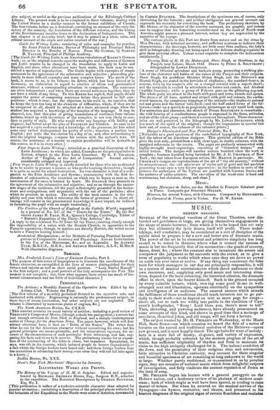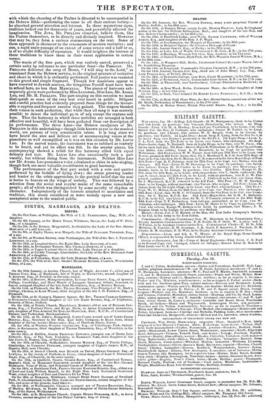MUSIC.
HEBREW MELODIES.
SEVERAL of the principal vocalists of the Great Theatres, now dis- banded and gentlemen at large, are giving themselves engagements in the shape of music-lectures ; from which it is to be hoped that not only they but ultimately the lyric drama itself will profit. These under- takings, well conducted, may be considered as a sort of discipline of the public mind to prepare it for a new and better sera of dramatic music. The power of the art in its elemental and primitive simplicity has long ceased to be tested in theatres, where what is termed the success of music is but too frequently that of its accessories—the gauds of scenery, dance, dress, &c. ; where the constant aim to intoxicate the senses and overpower the judgment so far succeeds with the crowd, as to give a term of popularity to works which when once they are down no power on earth can ever raise or revive. If any thing can counteract the false taste for which managers in our day are principally responsible, it will be a system of musical entertainments which throw audiences on their own resources, and, supplying only good music and interesting situa- tions, depend for the local colouring, the historical allusion, the dramatic effect in short, upon the hearer himself. Such is the ground occupied by every valuable lecture, which, treating some good theme in well- arranged text and illustration, operates electrically on the sympathies and intelligence of an audience. The assured success which attends the fulfilment of these conditions should teach lecturers not to go par- tially to their work—not to depend on text as mere pegs for songs— above all, not to rush too wildly into public in the condition of CAN- NING'S knifegrinder, " Story I Lord bless you, there's none to tell." Thin, shivering, and yawning audiences, have already pronounced OR some attempts of this kind, and shown in good time that a melange of anecdotes, theatrical jokes, and old songs, will not form a lecture. The subject treated by Mr. H. PHILLIPS on Wednesday, at the Music Hall, Store Street—on which occasion we heard the first of a series of lectures on the sacred and traditional melodies of the Hebrews—opens new ground, and is most happily timed. The age halts for want of melody; here is a store full of beauty, elegance, and variety of expression, which, though probably coloured by the modern progress of the art of music, has sufficient originality of rhythm and form to maintain its claim to the high antiquity challenged for it. The isolated condition of the Jews, and the peculiarity of their religious rites and ceremonies, little attractive to Christian curiosity, may account for these singular and beautiful specimens of art remaining so long unknown to the world at large. Whether purely traditional, or transmitted to us by peculiar signs, they are remains of national music which form delightful subjects of investigation, and fully vindicate the ancient reputation of Judea as the land of song. Mr. PHILLIPS began his lecture with a general panegyric on the Hebrew nation, and a laudatory review of its phalanx of modern musi- cians ; both of which might as well have been spared, as tending to raise matter of debate. But when he entered on the musical service of the Synagogue—its hymns, recitative, and chants, and presented to his hearers diagrams of the original signs of certain flourishes and ronlades with which the chanting of the Psalms is directed to be accompanied in the Hebrew Bible-performing the same in all their curious variety- he absorbed general attention and interest. In these mysterious signs, tradition looked out for thousands of years, and powerfully affected the imagination. The Jews, Mr. PHILLIPS observed, believe them, like the Psalms themselves, to be directly and divinely inspired. However that may be, they form a curious commentary on the text. Some of them approach in character to the ornaments of modern recitative ; and one, a rapid scale-passage of an extent of some octave and a half or so, is of no slight difficulty of execution. It would heighten the interest of these traditions to know them in their exact application to certain verses.
The music of the first part, which was entirely sacred, preserved a certain unity by reference to one particular feast-the Passover. Mr. PHILLIPS delivered the song of Moses, "I will sing to the Lord," as translated from the Hebrew service, to the original mixture of recitative and chant in which it is ordinarily performed. Full justice was rendered to this grand and simple fragment. Though few musicians appear to have resorted to Jewish sources, the Gregorian Pontiff must have been to school here, no less than MARCELLO. The pieces of harmony sub- sequently given were performed by Miss LHCOMBE, Miss LEO, Mr. ANSEL LEO, and Mr. H. PHILLIPS. The part-singing on this occasion we must distikaguish as some of the very best ever heard in public. Diligent and careful practice had evidently prepared these things for the favour- able reception and frequent encores they gained. The singers blended their voices in such perfection, that while they all sang it was scarcely possible to detect the individual pits of any except the soprano and bass. That the harmony in which these melodies are arranged is both effective and beautiful, will have been gathered from our description of its performance. The three Los-the Hebrew coadjutors of Mr. PHILLIPS in this undertaking- though little known as yet in the musical world, are persons of very considerable talent. It is long since we have heard the nice and delicate art of accompanying voices at the pianoforte so well exemplified as it was on this occasion by Mr. Louis LEO. In the sacred music, the instrument was so subdued as scarcely to be heard, and yet its effect was felt. In the secular pieces, his accompanying showed a relish for fine harmony allied with equal delicacy and tact. Mr. Louis LEO also occasionally took a part vocally, but without rising from the instrument. Neither Miss LEO nor Mr. ANSEL LEO possesses a voice calculated to shine in solo-singing, though both are most valuable contributors to good harmony.
The performances of the first part ended with a solo and quartet performed by the bedside of dying Jews ; the strain growing louder and louder as the crisis approaches, in the poetical belief that the soul is borne to heaven on the wings of melody. This was followed by a selection from the social and secular music of the same remarkable people ; all of which was distinguished by some novelty of rhythm or character. Independently of the interest attached to association and tradition, this music considered as mere melody opens a new and unexplored mine to the musical public.



























 Previous page
Previous page